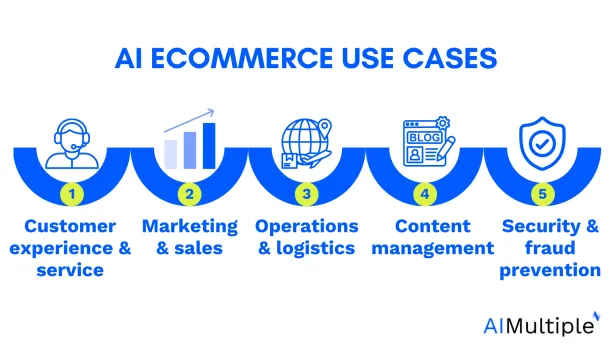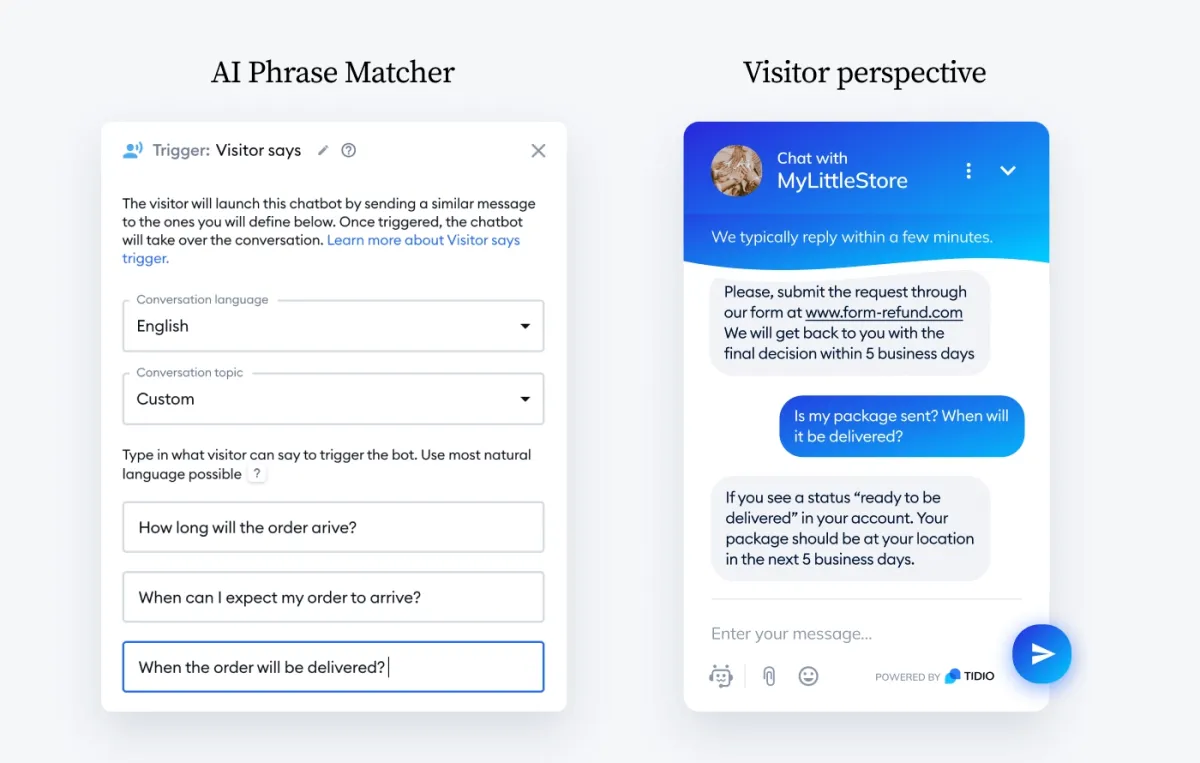AI is helping eCommerce businesses address key challenges like cart abandonment, inefficient customer support, and inventory mismanagement.
AI eCommerce tools can reduce churn, optimize operations, and deliver personalized shopping experiences by analyzing customer behavior.. These capabilities not only enhance customer satisfaction but also drive sales growth in a competitive market. As businesses increasingly adopt these solutions, it’s essential to stay updated on the top eCommerce technologies for businesses that can facilitate seamless integration and effective data analysis. By leveraging these advancements, companies can gain a significant edge and foster long-term customer loyalty.
Discover how these 25 AI applications can elevate your eCommerce strategy.

Customer experience and service
1. Chatbots and voice assistants in customer service
AI-powered chatbots and voice assistants have altered traditional customer interactions by providing instant responses to customer queries. These virtual assistants leverage natural language processing to understand and respond to a wide range of customer requests.
By automating routine tasks, these tools support human customer service representatives in handling more complex issues, improving the overall efficiency of business operations.
Real-life example: Tidio has launched AI chatbots for small and medium-sized businesses to enhance customer service, sales, and efficiency.
Key features include AI chatbots, an AI Phrase Matcher for natural language understanding, an FAQ Wizard to automate responses, and AI Agents that assist human operators with reply consistency and intent recognition (See Figure 1).1

Figure 1: Tidio eCommerce chatbot with phrase matcher.
2. Website personalization
eCommerce websites can analyze customer data, such as purchase history and browsing patterns, to present personalized product recommendations and marketing messages.
Personalization also helps eCommerce businesses build stronger customer relationships and loyalty.
3. Self-checkout systems
Self-checkout systems in eCommerce leverage computer vision and machine learning technologies. They streamline the purchase process by allowing online shoppers to complete transactions quickly and efficiently without human intervention.
4. Review and forum moderation
AI technology can also be used in eCommerce to monitor and moderate reviews and forums.
Machine learning algorithms can analyze customer data and detect inappropriate content, spam, or fraudulent reviews with the aim of maintaining the integrity of the online store.
5. Marketplace moderation
Marketplace moderation in the eCommerce industry uses AI-powered tools to oversee the interactions and transactions between buyers and sellers.
Fake products can negatively impact the consumer’s perception of the original company that makes the authentic product. Al can also help spot fake products.
Marketing and sales
6. Recommendation systems
Recommendation systems in eCommerce utilize machine learning algorithms to analyze customer data and provide personalized product suggestions.
These AI tools can enhance the online shopping experience by presenting relevant products while increasing customer satisfaction and sales. By leveraging user data and preferences, these tools can create personalized recommendations that cater to individual tastes. Additionally, generative AI applications in retail can optimize inventory management and streamline supply chains, ensuring that customers find what they are looking for without delay. This combination of personalization and efficiency leads to a more enjoyable shopping experience, fostering brand loyalty and repeat purchases.
7. Pricing optimization & sales forecasting
Pricing optimization involves adjusting prices dynamically based on customer behavior, market trends, and inventory levels.
By analyzing historical sales data and current market conditions, these AI solutions enable businesses to implement dynamic pricing strategies that maximize revenue and customer satisfaction.
Sales forecasting processes leverage AI to predict future sales based on historical sales data and customer behavior.
By analyzing various data points, including purchase history and market trends, AI tools can provide accurate forecasts that can help with inventory management and marketing strategies.
This predictive capability enables a more efficient sales process while minimizing overstock and stock-outs.
8. Auto-generated product descriptions
Using natural language processing, AI can automatically generate product descriptions that are engaging and informative for eCommerce businesses.
Auto-generated descriptions help online retailers provide detailed information quickly to improve customer interactions and support potential customers in their purchase decisions.
9. Conversion rate optimization testing
Conversion rate optimization (CRO) testing includes analyzing customer interactions on eCommerce websites and identifying the most effective changes to increase sales.
AI tools can recommend modifications to website design, content, and functionality by conducting A/B testing and analyzing customer behavior.
10. Retail & sales analytics
Retail analytics involves utilizing AI-powered tools to gather and analyze data points from various sources within an eCommerce business. These insights help online retailers understand customer behavior, optimize inventory management, and improve marketing campaigns.
By leveraging machine learning, eCommerce businesses can gain insights into marketing analytics, such as sales trends, customer preferences, and supply chain efficiency, to support decision-making processes and eCommerce business operations.
Sales analytics with AI allows for analyzing customer data and sales performance by examining metrics such as conversion rates, customer segments, and marketing campaign effectiveness.
11. Lead generation, scoring & prospecting
AI in eCommerce can automate the lead generation and lead scoring process by analyzing customer data and identifying potential customers who are likely to be interested in specific products or services.
AI in eCommerce can identify prospective customers by analyzing large sets of consumer data and detecting patterns that indicate purchase intent.
Identifying potential customers is crucial for B2B eCommerce companies. For example, anonymous website visitor identification vendors help businesses identify their website visitors so that marketing teams can reach out to them with personalized offers.
12. Email marketing for eCommerce
Email marketing for eCommerce leverages AI to create personalized and targeted email campaigns based on customer data such as purchase history and behavior.
Real-life example: iParts, an eCommerce business from Poland, utilized GetResponse to automate email marketing and manage abandoned cart campaigns.
With GetResponse’s email marketing automation features, iParts created and automated promotional and seasonal campaigns to boost conversion rates and enhance customer engagement. As a result, open rates for abandoned cart emails increased by 30%, and 20% of recipients made a purchase.2
For more information, check out AI in sales applications and use cases.
Operations and logistics
13. Inventory planning
Inventory planning uses machine learning algorithms to forecast demand and optimize stock levels, ensuring eCommerce retailers can meet customer needs without overstocking.
Implementing AI in inventory management processes provides eCommerce businesses a competitive advantage in the online shopping world.
14. Automated warehouses
Automated warehouses leverage AI technology and robotics to streamline logistics and improve efficiency in order fulfillment.
These AI-powered systems manage tasks such as sorting, packing, and shipping to reduce the need for human intervention. Automated warehouses can optimize storage and retrieval processes by leveraging machine learning, leading to faster delivery times.
Multiple fields in AI can enhance workflow in eCommerce companies’ warehouses. Some examples are:
- Warehouse robots,
- Damage detection, and
- Predictive maintenance.
If you want to learn more about how AI can elevate your logistics operations, check out logistics AI use cases and applications.
Content management
15. Content creation and curation
AI-powered text-based content creation and curation allows generating and selecting the most relevant content for eCommerce websites.
These AI tools can create product descriptions, blog posts, and social media content to provide a personalized shopping experience that meets customer needs and expectations.
16. Image generation, tagging, and recognition
AI technology enables image generation, tagging, and recognition by analyzing visual content and automatically generating descriptive tags.
Image tagging and recognition can enhance the accuracy and efficiency of product categorization.
Here are some of the most popular AI image applications:
- Image generation: Transforms text into images to create visual material quickly for various purposes like media and design.
- Semantic image-to-photo translation: Produces realistic versions of images based on semantic images or sketches.
- Image-to-image conversion: Alters external elements of an image, such as color or style, while keeping its core elements intact.
- Image resolution: Enhances image quality by creating high-resolution versions using Generative Adversarial Networks (GANs).
- 3D shape generation: Generates detailed 3D versions of objects that closely resemble the original source using GAN-based methods.
Real-life example: Pinterest allows users to select an item from any online photo and then use Pinterest’s image recognition software to identify similar items (See Figure 2).

Figure 2: Pinterest visual search engine.3
17. SEO optimization
By analyzing search engine algorithms and customer queries, AI tools also enable SEO optimization.
Machine learning algorithms allow identifying relevant keywords and the optimization of content structure to help eCommerce websites rank higher in search results. This optimization can increase organic traffic while attracting potential customers and supporting eCommerce sales.
18. Content moderation
AI technology allows monitoring and filtering of user-generated content to ensure that it meets community guidelines and quality standards.
AI tools can help maintain a safe online environment by utilizing machine learning algorithms to detect inappropriate or harmful content.
19. Content trend analysis
AI eCommerce platforms can identify popular topics and preferences by examining large amounts of customer data and social media activity.
This analysis provides eCommerce businesses with actionable insights into customer behavior and emerging trends so they can tailor their content strategy accordingly. By predicting what will resonate with audiences in the near future, AI can empower eCommerce businesses to: This analysis provides eCommerce businesses with actionable insights into customer behavior and emerging trends so they can tailor their content strategy accordingly. By predicting what will resonate with audiences in the near future, AI can empower eCommerce businesses to:
- Anticipate customer needs: Tailor content strategies to proactively address customer questions and preferences.
- Enhance content engagement: Create more targeted and compelling content that aligns with emerging trends.
- Optimize resource allocation: Focus on high-impact content areas, reducing the time and effort spent on low-performing topics.
20. Dynamic content delivery
By analyzing customer interactions and data points, AI tools can adjust website content, product recommendations, and marketing messages to create a customized online shopping experience.
Security and fraud prevention
21. Fraud detection & prevention
AI-powered fraud detection uses machine learning algorithms to identify suspicious transactions and patterns that deviate from customer behavior.
These systems can detect and prevent fraudulent activities in real time to ensure a secure online shopping experience.
Payment fraud prevention leverages AI and machine learning to analyze transaction data and detect fraudulent payment activities.
AI tools can monitor payment patterns and customer interactions in real time, flag suspicious transactions, and prevent fraudulent payments from being processed.
22. Account takeover protection
Account takeover protection with AI allows monitoring and detecting unusual login activities that may indicate unauthorized access to customer accounts.
23. Bot and anomaly detection
AI-powered bot and anomaly detection systems identify and mitigate malicious bots and abnormal activities on eCommerce websites.
By analyzing website traffic patterns, these AI tools can distinguish between legitimate users and harmful bots while protecting the platform from automated attacks and data scraping.
24. Identity verification
Identity verification protocols utilize machine learning and computer vision to authenticate customers’ identities during the registration and transaction processes.
Leveraging biometric data analysis such as facial recognition or fingerprint scanning, these AI tools ensure that customers are who they claim to be.
25. AI for enhanced cybersecurity
AI solutions can leverage machine learning algorithms to identify vulnerabilities, predict potential attacks, and implement defensive measures in real time.
As data is considered to be one of the greatest assets of businesses and the average cost of a data breach is ~4 million, investing in AI cybersecurity is an important step for eCommerce retailers.
Benefits of integrating AI in eCommerce
Leveraging AI can help eCommerce businesses to:
Increase revenue and operational efficiency
By providing insights into customer behaviors and preferences, companies can reduce customer churn and tailor their offerings to make them more relevant and engaging.
Improve sales
Through cross-selling and upselling by:
- Analyzing customer data to predict which products a customer might be interested in,
- Enabling personalized email recommendations, in-app suggestions, or targeted advertisements,
- Automating these processes to reduce costs associated with manual marketing efforts and customer service interactions.
Increase accessibility
By providing features like voice-to-text functionality, automated translations, and intuitive navigation.
Inventory and supply chain optimization
- Demand forecasting: Analyze historical sales data and trends to predict future demand, therefore ensuring optimal stock levels.
- Reducing waste: By predicting demand accurately, minimize overstocking and under-stocking to reduce costs and waste.

Customer experience and service
1. Chatbots and voice assistants in customer service
AI-powered chatbots and voice assistants have altered traditional customer interactions by providing instant responses to customer queries. These virtual assistants leverage natural language processing to understand and respond to a wide range of customer requests.
By automating routine tasks, these tools support human customer service representatives in handling more complex issues, improving the overall efficiency of business operations.
Real-life example: Tidio has launched AI chatbots for small and medium-sized businesses to enhance customer service, sales, and efficiency.
Key features include AI chatbots, an AI Phrase Matcher for natural language understanding, an FAQ Wizard to automate responses, and AI Agents that assist human operators with reply consistency and intent recognition (See Figure 1).4

Figure 1: Tidio eCommerce chatbot with phrase matcher.
2. Website personalization
eCommerce websites can analyze customer data, such as purchase history and browsing patterns, to present personalized product recommendations and marketing messages.
Personalization also helps eCommerce businesses build stronger customer relationships and loyalty.
3. Self-checkout systems
Self-checkout systems in eCommerce leverage computer vision and machine learning technologies. They streamline the purchase process by allowing online shoppers to complete transactions quickly and efficiently without human intervention.
4. Review and forum moderation
AI technology can also be used in eCommerce to monitor and moderate reviews and forums.
Machine learning algorithms can analyze customer data and detect inappropriate content, spam, or fraudulent reviews with the aim of maintaining the integrity of the online store.
5. Marketplace moderation
Marketplace moderation in the eCommerce industry uses AI-powered tools to oversee the interactions and transactions between buyers and sellers.
Fake products can negatively impact the consumer’s perception of the original company that makes the authentic product. Al can also help spot fake products.
Marketing and sales
6. Recommendation systems
Recommendation systems in eCommerce utilize machine learning algorithms to analyze customer data and provide personalized product suggestions.
These AI tools can enhance the online shopping experience by presenting relevant products while increasing customer satisfaction and sales. By leveraging user data and preferences, these tools can create personalized recommendations that cater to individual tastes. Additionally, generative AI applications in retail can optimize inventory management and streamline supply chains, ensuring that customers find what they are looking for without delay. This combination of personalization and efficiency leads to a more enjoyable shopping experience, fostering brand loyalty and repeat purchases.
7. Pricing optimization & sales forecasting
Pricing optimization involves adjusting prices dynamically based on customer behavior, market trends, and inventory levels.
By analyzing historical sales data and current market conditions, these AI solutions enable businesses to implement dynamic pricing strategies that maximize revenue and customer satisfaction.
Sales forecasting processes leverage AI to predict future sales based on historical sales data and customer behavior.
By analyzing various data points, including purchase history and market trends, AI tools can provide accurate forecasts that can help with inventory management and marketing strategies.
This predictive capability enables a more efficient sales process while minimizing overstock and stock-outs.
8. Auto-generated product descriptions
Using natural language processing, AI can automatically generate product descriptions that are engaging and informative for eCommerce businesses.
Auto-generated descriptions help online retailers provide detailed information quickly to improve customer interactions and support potential customers in their purchase decisions.
9. Conversion rate optimization testing
Conversion rate optimization (CRO) testing includes analyzing customer interactions on eCommerce websites and identifying the most effective changes to increase sales.
AI tools can recommend modifications to website design, content, and functionality by conducting A/B testing and analyzing customer behavior.
10. Retail & sales analytics
Retail analytics involves utilizing AI-powered tools to gather and analyze data points from various sources within an eCommerce business. These insights help online retailers understand customer behavior, optimize inventory management, and improve marketing campaigns.
By leveraging machine learning, eCommerce businesses can gain insights into marketing analytics, such as sales trends, customer preferences, and supply chain efficiency, to support decision-making processes and eCommerce business operations.
Check out AI applications in retail to learn more.
Sales analytics with AI allows for analyzing customer data and sales performance by examining metrics such as conversion rates, customer segments, and marketing campaign effectiveness.
11. Lead generation, scoring & prospecting
AI in eCommerce can automate the lead generation and lead scoring process by analyzing customer data and identifying potential customers who are likely to be interested in specific products or services.
AI in eCommerce can identify prospective customers by analyzing large sets of consumer data and detecting patterns that indicate purchase intent.
Identifying potential customers is crucial for B2B eCommerce companies. For example, anonymous website visitor identification vendors help businesses identify their website visitors so that marketing teams can reach out to them with personalized offers.
12. Email marketing for eCommerce
Email marketing for eCommerce leverages AI to create personalized and targeted email campaigns based on customer data such as purchase history and behavior.
Real-life example: iParts, an eCommerce business from Poland, utilized GetResponse to automate email marketing and manage abandoned cart campaigns.
With GetResponse’s email marketing automation features, iParts created and automated promotional and seasonal campaigns to boost conversion rates and enhance customer engagement. As a result, open rates for abandoned cart emails increased by 30%, and 20% of recipients made a purchase.5
For more information, check out AI in sales applications and use cases.
Operations and logistics
13. Inventory planning
Inventory planning uses machine learning algorithms to forecast demand and optimize stock levels, ensuring eCommerce retailers can meet customer needs without overstocking.
Implementing AI in inventory management processes provides eCommerce businesses a competitive advantage in the online shopping world.
14. Automated warehouses
Automated warehouses leverage AI technology and robotics to streamline logistics and improve efficiency in order fulfillment.
These AI-powered systems manage tasks such as sorting, packing, and shipping to reduce the need for human intervention. Automated warehouses can optimize storage and retrieval processes by leveraging machine learning, leading to faster delivery times.
Multiple fields in AI can enhance workflow in eCommerce companies’ warehouses. Some examples are:
- Warehouse robots,
- Damage detection, and
- Predictive maintenance.
If you want to learn more about how AI can elevate your logistics operations, check out logistics AI use cases and applications.
Content management
15. Content creation and curation
AI-powered text-based content creation and curation allows generating and selecting the most relevant content for eCommerce websites.
These AI tools can create product descriptions, blog posts, and social media content to provide a personalized shopping experience that meets customer needs and expectations.
16. Image generation, tagging, and recognition
AI technology enables image generation, tagging, and recognition by analyzing visual content and automatically generating descriptive tags.
Image tagging and recognition can enhance the accuracy and efficiency of product categorization.
Here are some of the most popular AI image applications:
- Image generation: Transforms text into images to create visual material quickly for various purposes like media and design.
- Semantic image-to-photo translation: Produces realistic versions of images based on semantic images or sketches.
- Image-to-image conversion: Alters external elements of an image, such as color or style, while keeping its core elements intact.
- Image resolution: Enhances image quality by creating high-resolution versions using Generative Adversarial Networks (GANs).
- 3D shape generation: Generates detailed 3D versions of objects that closely resemble the original source using GAN-based methods.
Real-life example: Pinterest allows users to select an item from any online photo and then use Pinterest’s image recognition software to identify similar items (See Figure 2).

Figure 2: Pinterest visual search engine.6
17. SEO optimization
By analyzing search engine algorithms and customer queries, AI tools also enable SEO optimization.
Machine learning algorithms allow identifying relevant keywords and the optimization of content structure to help eCommerce websites rank higher in search results. This optimization can increase organic traffic while attracting potential customers and supporting eCommerce sales.
18. Content moderation
AI technology allows monitoring and filtering of user-generated content to ensure that it meets community guidelines and quality standards.
AI tools can help maintain a safe online environment by utilizing machine learning algorithms to detect inappropriate or harmful content.
19. Content trend analysis
AI eCommerce platforms can identify popular topics and preferences by examining large amounts of customer data and social media activity.
This analysis provides eCommerce businesses with actionable insights into customer behavior and emerging trends so they can tailor their content strategy accordingly. By predicting what will resonate with audiences in the near future, AI can empower eCommerce businesses to: This analysis provides eCommerce businesses with actionable insights into customer behavior and emerging trends so they can tailor their content strategy accordingly. By predicting what will resonate with audiences in the near future, AI can empower eCommerce businesses to:
- Anticipate customer needs: Tailor content strategies to proactively address customer questions and preferences.
- Enhance content engagement: Create more targeted and compelling content that aligns with emerging trends.
- Optimize resource allocation: Focus on high-impact content areas, reducing the time and effort spent on low-performing topics.
20. Dynamic content delivery
By analyzing customer interactions and data points, AI tools can adjust website content, product recommendations, and marketing messages to create a customized online shopping experience.
Security and fraud prevention
21. Fraud detection & prevention
AI-powered fraud detection uses machine learning algorithms to identify suspicious transactions and patterns that deviate from customer behavior.
These systems can detect and prevent fraudulent activities in real time to ensure a secure online shopping experience.
Payment fraud prevention leverages AI and machine learning to analyze transaction data and detect fraudulent payment activities.
AI tools can monitor payment patterns and customer interactions in real time, flag suspicious transactions, and prevent fraudulent payments from being processed.
22. Account takeover protection
Account takeover protection with AI allows monitoring and detecting unusual login activities that may indicate unauthorized access to customer accounts.
23. Bot and anomaly detection
AI-powered bot and anomaly detection systems identify and mitigate malicious bots and abnormal activities on eCommerce websites.
By analyzing website traffic patterns, these AI tools can distinguish between legitimate users and harmful bots while protecting the platform from automated attacks and data scraping.
24. Identity verification
Identity verification protocols utilize machine learning and computer vision to authenticate customers’ identities during the registration and transaction processes.
Leveraging biometric data analysis such as facial recognition or fingerprint scanning, these AI tools ensure that customers are who they claim to be.
25. AI for enhanced cybersecurity
AI solutions can leverage machine learning algorithms to identify vulnerabilities, predict potential attacks, and implement defensive measures in real time.
As data is considered to be one of the greatest assets of businesses and the average cost of a data breach is ~4 million, investing in AI cybersecurity is an important step for eCommerce retailers.
Learn cybersecurity best practices.
Benefits of integrating AI in eCommerce
Leveraging AI can help eCommerce businesses to:
Increase revenue and operational efficiency
By providing insights into customer behaviors and preferences to reduce customer churn and tailor their offerings to make them more relevant and engaging.
Improve sales
Through cross-selling and upselling by:
- Analyzing customer data to predict which products a customer might be interested in,
- Enabling personalized email recommendations, in-app suggestions, or targeted advertisements,
- Automating these processes to reduce costs associated with manual marketing efforts and customer service interactions.
Increase accessibility
By providing features like voice-to-text functionality, automated translations, and intuitive navigation.
Inventory and supply chain optimization
- Demand forecasting: Analyze historical sales data and trends to predict future demand, therefore ensuring optimal stock levels.
- Reducing waste: By predicting demand accurately, minimize overstocking and under-stocking to reduce costs and waste.
Further reading:
External Links
- 1. Launching Tidio AI to Empower SMBs With AI Features. Tidio
- 2. Increased sales with automation that retrieves abandoned shopping carts. 20% of recipients made a purchase. iParts
- 3. Our crazy-fun new visual search tool | Pinterest Newsroom Archive.
- 4. Launching Tidio AI to Empower SMBs With AI Features. Tidio
- 5. Increased sales with automation that retrieves abandoned shopping carts. 20% of recipients made a purchase. iParts
- 6. Our crazy-fun new visual search tool | Pinterest Newsroom Archive.



Comments
Your email address will not be published. All fields are required.